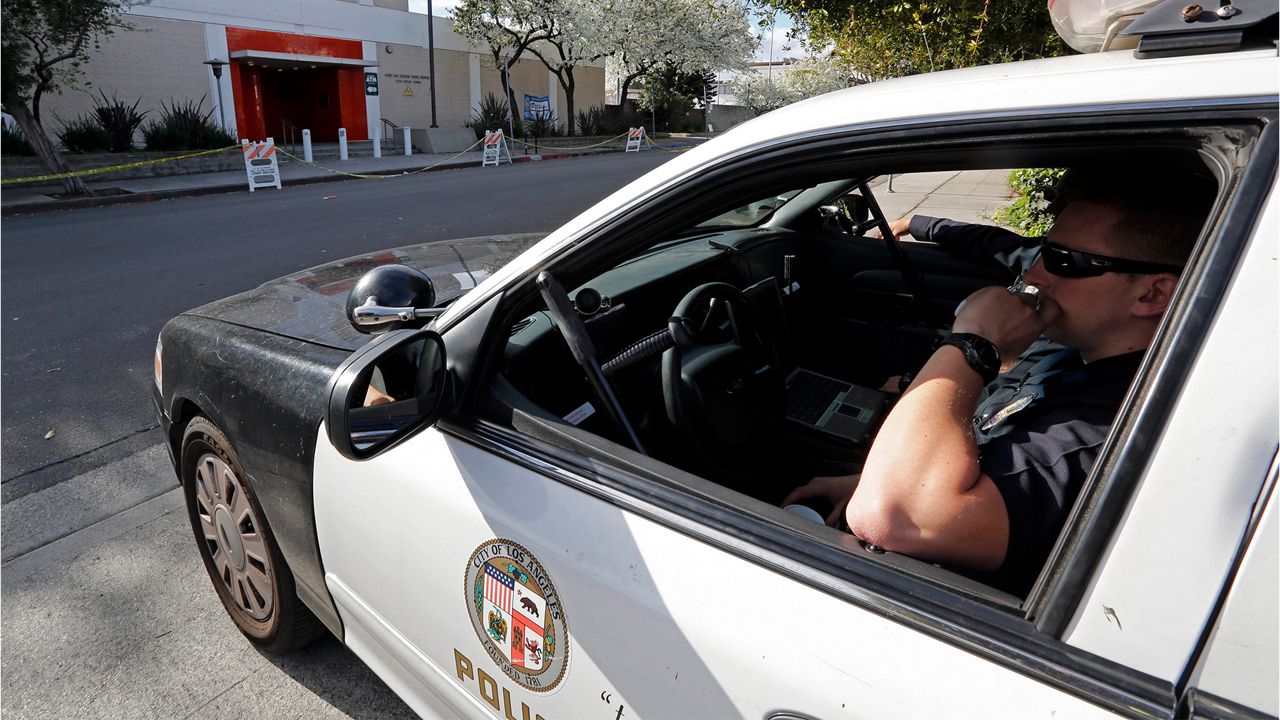LOS ANGELES (CNS) — The Los Angeles Police Commission updated its policy on so-called "pretextual stops" Tuesday to discipline officers — beginning with additional training — if they don't articulate in the moment why a traffic or other minor violation escalates into a criminal investigation.
The Los Angeles Police Department defines a pretextual stop as one in which officers conducting a minor traffic or code violation escalate it into an investigation of a more serious crime unrelated to the initial violation.
According to the Office of the Inspector General, there were "pretty substantial racial disparities" in stops, many of which were pretextual stops, conducted by the department in 2019, and "a fairly small number of them yielded evidence of serious crimes or ended up resulting in any kind of arrests."
Those findings led the commission to request that the department update its policy, according to Commission President William Briggs.
"Those pretextual stops do not result in guns being taken off the streets, those pretextual stops do not result in curtailing murders and curtailing shootings ... there is no data that anyone can point to that establishes that pretextual stops curtail violent crime in our city," said Briggs, adding that data collected for the Racial and Identity Profiling Act "shows just the opposite."
Under the updated policy, officers making a pretextual stop will have to articulate on their body-worn video cameras the reason for the change.
"An officer's training, experience and expertise may be used in articulating the additional information the officers used to initiate the stop," the policy update states.
The policy also states that pretextual stops can only happen if officers "are acting upon articulable information" and not a "mere hunch or on generalized characteristics," including race.
Failure to articulate the information that prompted the officer to make a pretext stop will result in "progressive discipline beginning with counseling and retraining." The policy adds that discipline will escalate as more violations of the policy are made.
City Councilman Marqueece Harris-Dawson joined the police commission meeting and called the policy update a "huge step in the right direction." He noted that public trust in the police is "so easily degraded when a person is stopped and they can't figure out why they were stopped or that the reason they were given just doesn't add up for them."
He added, "I don't know of an African American male driver, (and) I know very few Latino male drivers, who don't have half-a-dozen stories about" being stopped by police for reasons that didn't make sense.
"It's clear to them, or at least leaves the impression, that: `I am a person, I'm an individual in this space and for some reason, this officer has decided that I'm suspicious,"' Harris-Dawson said.
Several people called in to Tuesday's meeting to oppose the motion for allowing pretextual stops to continue at all. Hamid Khan of the Stop LAPD Spying Coalition called the policy update a "facade of reform."
"They still want to maintain their capacity to stop people because if this was truly, they wanted to change this, they would completely ban the pretextual stop," Khan told City News Service on Tuesday. "... That pretext is about racial profiling, this is about targeting particular communities and this is about constant harassment and intimidation."
Mona Sutton, who identified herself as the representative for the Community Police Advisory Board for the South Bureau and Harbor Area, said she opposed the policy update for limiting officers' ability to make pretextual stops, arguing against others' beliefs that it undermines public trust in the police.
Another caller also opposed changes to the policy, saying pretextual stops lead to officers finding firearms and drugs.
Police Chief Michel Moore responded to those concerns Tuesday.
"I've heard thoroughly members of this organization who believe that this policy will stop us from identifying those responsible for violent crime, stop us from identifying those that are carrying weapons, firearms, engaged in street violence. I firmly believe that that is not the case," Moore said.
In a preamble to the policy that will be added to the department's manual, the LAPD notes:
"While the exercise of an officer's discretion in initiating a `stop' or conducting a detention is authored under the law, it should reflect the necessary balance of the role of law enforcement in the prevention of crime and receiving and thereafter maintaining the community's trust that the officer's actions are fair and without bias."
The statement adds that stops can promote public safety and protect the public, but can subject motorists and pedestrians to "inconvenience, confusion and anxiety," as well as harm the relationship between police and the community, with many considering such stops racially biased or unfair.
"To maintain public trust, the Department's use of pretext stops as a crime reduction strategy must be measured in furtherance of achieving the necessary balance between the perception of fairness and identifying those engaged in serious criminal conduct," the preamble adds.
Commissioner Briggs' comments that pretextual stops have not reduced violent crime drew opposition from the Los Angeles Police Protective League, the union representing Los Angeles police officers.
"Police Commissioner Briggs should get off his soapbox, do his homework and tell the truth about pre-text stops and the important role they play in taking guns off our streets," the league's Board of Directors said in a statement issued after the meeting.
"Last year in just the Newton Division, officers recovered 817 firearms during 726 incidents. Of the 726 incidents, 699 resulted in an arrest being made, of which 507 suspects were arrested by traffic stops and 115 by pedestrian stops. That's a significant amount of illegal guns taken out of our neighborhoods," the statement continued.



